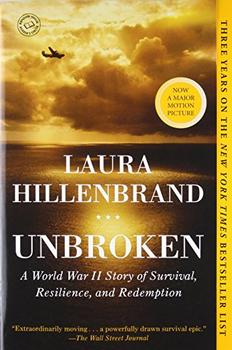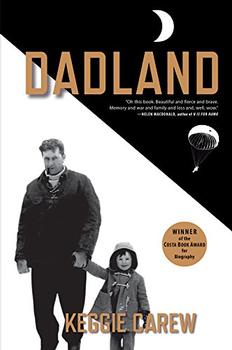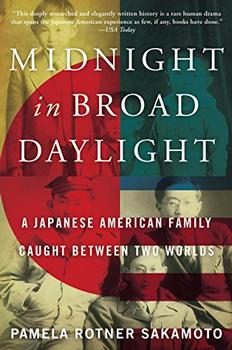Summary | Excerpt | Reading Guide | Reviews | Beyond the book | Read-Alikes | Genres & Themes | Author Bio

A World War II Story of Survival, Resilience, and Redemption
by Laura HillenbrandIn her long-awaited new book, Laura Hillenbrand writes with the same rich and vivid narrative voice she displayed in Seabiscuit. Telling an unforgettable story of a man's journey into extremity, Unbroken is a testament to the resilience of the human mind, body, and spirit.
Rated The Best Book of 2011 by BookBrowse Members
On a May afternoon in 1943, an Army Air Forces bomber crashed into the Pacific Ocean and disappeared, leaving only a spray of debris and a slick of oil, gasoline, and blood. Then, on the ocean surface, a face appeared. It was that of a young lieutenant, the plane's bombardier, who was struggling to a life raft and pulling himself aboard. So began one of the most extraordinary odysseys of the Second World War.
The lieutenant’s name was Louis Zamperini. In boyhood, he'd been a cunning and incorrigible delinquent, breaking into houses, brawling, and fleeing his home to ride the rails. As a teenager, he had channeled his defiance into running, discovering a prodigious talent that had carried him to the Berlin Olympics and within sight of the four-minute mile. But when war had come, the athlete had become an airman, embarking on a journey that led to his doomed flight, a tiny raft, and a drift into the unknown.
Ahead of Zamperini lay thousands of miles of open ocean, leaping sharks, a foundering raft, thirst and starvation, enemy aircraft, and, beyond, a trial even greater. Driven to the limits of endurance, Zamperini would answer desperation with ingenuity; suffering with hope, resolve, and humor; brutality with rebellion. His fate, whether triumph or tragedy, would be suspended on the fraying wire of his will.
In her long-awaited new book, Laura Hillenbrand writes with the same rich and vivid narrative voice she displayed in Seabiscuit. Telling an unforgettable story of a man's journey into extremity, Unbroken is a testament to the resilience of the human mind, body, and spirit.
When a book generates as much pre-publication buzz as Laura Hillenbrand's Unbroken, I tend to be a bit prejudiced against it from the start. I've found that rarely do books live up to the expectations I've developed for them based on the press they've generated. I was delighted to find, though, that Unbroken not only lives up to its hype, but far surpasses it. I can honestly say that I can't remember the last time a non-fiction book held my attention as well as this one did, from start to finish. It's the first book I've read in a very long time that I've wanted to force on all my friends. Yes, it's that good...continued
Full Review
(808 words)
This review is available to non-members for a limited time. For full access,
become a member today.
(Reviewed by Kim Kovacs).
Much of Unbroken relays Louis Zamperini's experiences as a Japanese prisoner of war. Hillenbrand cites staggering statistics. Zamperini was but one of approximately 132,000 POWs from the United States, Britain, Canada, New Zealand, Holland and Australia. More than a quarter of these prisoners died, including 12,935 Americans (more than 37 percent of Americans captured by the Japanese). These numbers don't include the thousands of Chinese who were murdered, nor those prisoners killed after surrender but before reaching the POW camps (for example, those who perished along the sixty-mile Bataan Death March in the Philippines). By comparison, only 1 percent of Americans held by the Nazis and Italians died during WWII.
While there ...
This "beyond the book" feature is available to non-members for a limited time. Join today for full access.

If you liked Unbroken, try these:

by Keggie Carew
Published 2018
A spellbinding journey into surprising and shady corners of twentieth-century politics, a rackety English childhood, the poignant breakdown of a family, the corridors of dementia and beyond.

by Pamela Rotner Sakamoto
Published 2017
Alternating between American and Japanese perspectives, Midnight in Broad Daylight provides a fresh look at the dropping of the first atomic bomb.



The most successful people are those who are good at plan B
Click Here to find out who said this, as well as discovering other famous literary quotes!